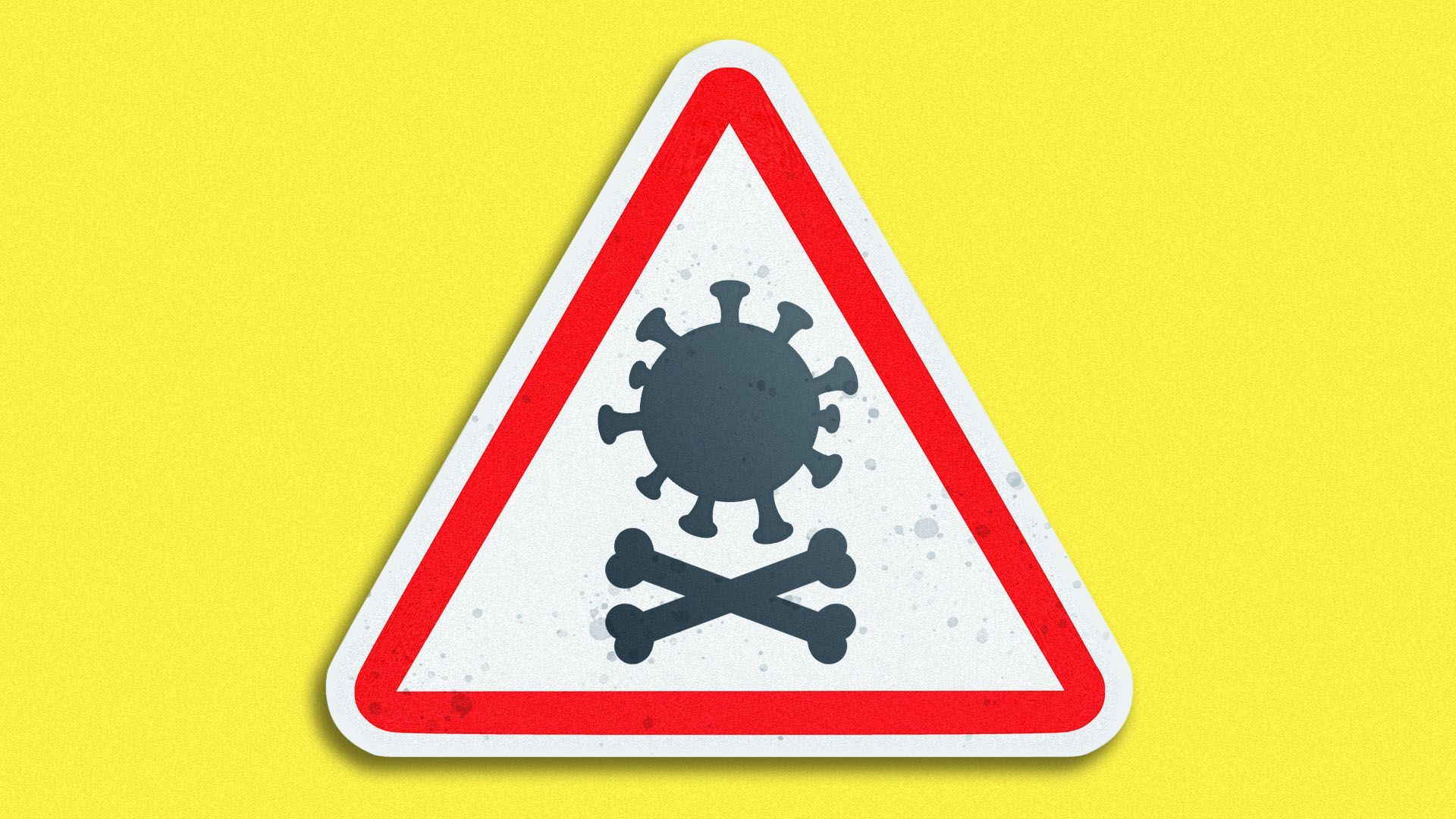Coronavirus variants demand a tougher response
Add Axios as your preferred source to
see more of our stories on Google.

Illustration: Sarah Grillo/Axios
New, more contagious coronavirus variants threaten the U.S. response to COVID-19 just as the best tools to fight it are becoming available.
Why it matters: As our response to COVID-19 evolves and improves with the introduction of vaccines, so does SARS-CoV-2 itself, with new variants emerging. The next few months will demand harsher measures to control the pandemic at the very moment when exhaustion is peaking.
Driving the news: On Monday evening, Minnesota reported the first confirmed case of the P.1 Brazilian variant of the novel coronavirus in a Twin Cities resident with a recent travel history to Brazil.
- P.1 is one of four variants — mutated strains of SARS-CoV-2 that seem to spread more efficiently than the original coronavirus — the CDC is watching with concern.
- That includes the B.1.1.7 variant first identified in the U.K., which has now been detected in more than 20 states and which British scientists warn is both more contagious and potentially more deadly than the original strain.
- CDC officials project the U.K. variant could become dominant in the U.S. by March, which would drive more cases without a tougher response.
Details: The emergence of the new variants has driven governments to reimpose some border controls in an effort to stop their introduction, while scientists are pushing for more restrictions and hardier protective equipment.
- Germany last week proposed strict, temporary bans on travel to the EU — including EU citizens returning to their nations — from countries where variants are prevalent, like Britain.
- President Biden quickly instituted a ban on travelers coming into the U.S. from more than 25 countries, including all the nations in Europe's free-travel Schengen Area — though the order does not include U.S. citizens, a loophole that minimized the effectiveness of earlier bans.
- In light of the more contagious variants, NIAID director Anthony Fauci told NBC's "Today," it "makes common sense" to wear more than one layer of mask. Even better would be an N95 medical-grade mask, but even a year into the pandemic, supplies remain so low that the CDC still says they should be reserved for health-care workers.
Context: At the same time, new COVID-19 cases and reported hospitalizations in the U.S. have fallen significantly in recent weeks, which in turn has led states like California to loosen restrictions on activity.
- That's good news — as is the slightly increased pace in vaccinations — but average deaths per day this month are still above 3,000, and the overall COVID-19 risk level throughout the country is still far higher than it was in the fall.
- Recent research shows Americans as of late November were much less likely to observe social distancing than they were at the start of the pandemic, even though the risk — especially with the emerging variants — is likely even higher now.
- In countries like Denmark where more contagious variants have taken hold, the pandemic is defeating efforts to control it.
Be smart: We can simultaneously be doing almost enough to control the spread of the original coronavirus strain and not enough to control more dangerous variants.
- "There are essentially two separate COVID-19 epidemics," the National Institute for Public Health and the Environment in the Netherlands reported last week. "One epidemic involving the ‘old’ variant, in which infections are decreasing, and another epidemic involving the (new) variant, in which infections are increasing."
- We don't know for sure which epidemic currently has a hold over the U.S., in part because genomic surveillance here lags well behind countries like Denmark or the U.K., meaning variants could be spreading under the radar.
- But the more the coronavirus spreads, the more opportunities variants will have to crowd out their competition — or for entirely new mutants to emerge.
Yes, but: All indications are that existing vaccines will remain effective against the known variants.
- One possible exception is the South African variant 501Y.V2. Moderna reported this week that the antibodies triggered by its vaccines were less effective at neutralizing the variant, though the vaccine still provided significant protection and the company said it could develop a booster shot if needed.
What to watch: California-based Clear Labs today announced an automated whole-genome sequencing solution that can determine the full sequence of a SARS-CoV-2 infection in less than 24 hours with little hands-on lab work, compared to days for many current techniques.
- "It's very important to quickly find out if there are changes in the virus that impacts response to the vaccine, and you're not going to get that from a PCR test," says Jeff Field, chief commercial officer at Clear Labs.
The bottom line: Think of this next and most dangerous stage of the pandemic as a three-sided race: more contagious variants against the pace of vaccinations against our own willingness to endure more social distancing.
- With the ranks of the immunized growing, it won't be a marathon, thankfully — but it won't be a sprint either.
